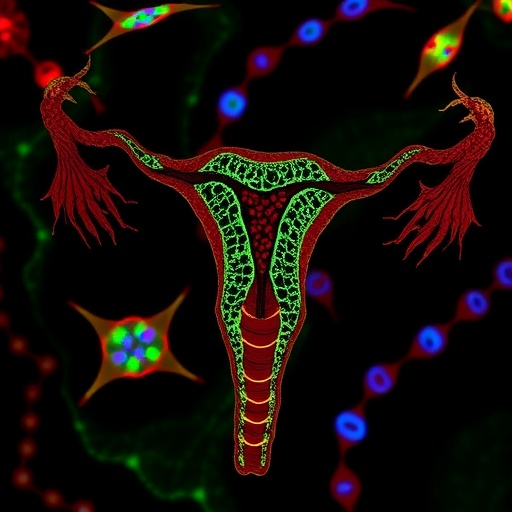In a groundbreaking study published in the Journal of Ovarian Research, researchers from a leading university have unveiled a remarkable advancement in reproductive medicine. The focus of their investigation was on the restoration of ovarian function in rats with Premature Ovarian Insufficiency (POI) through the therapeutic potential of Human Umbilical Cord Mesenchymal Stem Cells (hUCMSCs). The implications of this study for women experiencing similar conditions are profound, as the findings pave the way for innovative treatments aimed at restoring fertility.
Premature Ovarian Insufficiency is a condition that affects numerous women worldwide, leading to significant emotional, physical, and psychological challenges. Typically diagnosed before the age of 40, POI can result in infertility due to hormonal imbalance and inadequate ovarian function. The condition is often linked to genetic factors, autoimmune diseases, and certain cancer treatments, making it a complex and multifaceted medical issue that requires comprehensive research.
The researchers embarked on a detailed exploration of hUCMSCs and their ability to modulate ovarian function through angiogenesis – the formation of new blood vessels. The process is critical to ovarian health, as it ensures a steady supply of nutrients and hormones that are essential for ovarian follicle development and overall reproductive function. The study specifically looked to establish a correlation between angiopoietins, which are proteins involved in blood vessel formation, and the therapeutic effects of hUCMSCs in the POI rat model.
To begin their investigation, the team meticulously prepared a cohort of rats that exhibited signs of POI, ensuring they adhered to stringent scientific protocols. The administration of hUCMSCs was carefully timed in relation to the onset of hormonal treatment, allowing the researchers to observe natural and adaptive responses in the ovarian environment. Throughout the experimental timeline, the team monitored the morphological and functional restoration of ovarian tissues to better understand how the stem cells impacted overall ovarian health.
The findings revealed that the administration of hUCMSCs significantly rebalanced the levels of angiopoietin-1 and angiopoietin-2 proteins. This rebalance was crucial in enhancing blood vessel density within the ovaries, thereby promoting improved ovarian function. The results demonstrated that the stem cells not only facilitated angiogenesis but also played a vital role in hormone regulation, suggesting a multifaceted approach to treating POI through cellular therapy.
Moreover, the researchers noted that the hUCMSCs exerted a protective effect on ovarian follicles, thereby increasing survival rates and potential for fertility. Confirmatory tests indicated that the treated rats demonstrated increased estrus cycles and higher levels of sex hormones such as estrogen and progesterone, both of which are pivotal to reproductive health. These biomarkers not only confirm restored ovarian function but also highlight the potential broader applications of hUCMSCs in reproductive medicine.
What sets this study apart is its innovative approach to treating a condition that currently has limited therapeutic options. Existing treatments, such as hormone replacement therapy, often do not address the underlying causes of POI and may come with substantial side effects. The use of hUCMSCs provides a novel and potentially more effective means of restoring ovarian function, as it targets multiple pathways involved in reproduction.
The researchers are keen to emphasize that while the results are promising, further studies involving human trials will be essential to validate the efficacy and safety of hUCMSCs in treating POI in women. Future research will explore optimal dosages, long-term effects, and any possible immunogenic responses that hUCMSCs may trigger. The goal of such investigations is not only to establish a clear treatment protocol but also to understand the dynamics of stem cell therapy in the context of reproductive health.
As interest in regenerative medicine continues to grow, this study marks a significant milestone in the understanding of stem cell applications for reproductive health. It highlights the potential for personalized medicine approaches that leverage the regenerative capabilities of stem cells to address previously untreatable conditions such as POI.
Ultimately, the findings could revolutionize how healthcare providers approach fertility preservation and restoration, especially for women diagnosed with POI. It could lead to more holistic and effective treatment options that tap into the body’s natural healing processes, offering hope to countless individuals facing the challenges of infertility. With further investigation, hUCMSCs might soon transcend the laboratory and enter clinics, representing a new frontier in reproductive medicine.
In conclusion, this research not only underscores the complex interplay between angiogenesis and ovarian function but also opens avenues for innovative treatments. The potential to revolutionize reproductive health for women suffering from POI should inspire further exploration and investment in stem cell research that aims to restore reproductive capabilities. As the scientific community eagerly anticipates the next steps, there is a shared vision of a future where conditions like POI can be effectively managed or even cured, enhancing the lives of many.
Subject of Research: Restoration of ovarian function in POI rats using hUCMSCs
Article Title: hUCMSCs restore ovarian function via angiopoietin 1/2 rebalance in POI rats
Article References:
Luo, Q., Liu, C., Su, Y. et al. hUCMSCs restore ovarian function via angiopoietin 1/2 rebalance in POI rats. J Ovarian Res 18, 269 (2025). https://doi.org/10.1186/s13048-025-01856-3
Image Credits: AI Generated
DOI: https://doi.org/10.1186/s13048-025-01856-3
Keywords: Human Umbilical Cord Mesenchymal Stem Cells, Premature Ovarian Insufficiency, Angiogenesis, Ovarian Function Restoration, Stem Cell Therapy
Tags: angiogenesis and fertilityautoimmune diseases and fertilityemotional impact of infertilitygenetic factors in ovarian insufficiencyhormonal balance in ovarian healthhUCMSCs in reproductive medicineHuman Umbilical Cord Mesenchymal Stem Cellsinfertility solutions for womeninnovative treatments for POIovarian function restorationovarian health research advancementspremature ovarian insufficiency treatment





